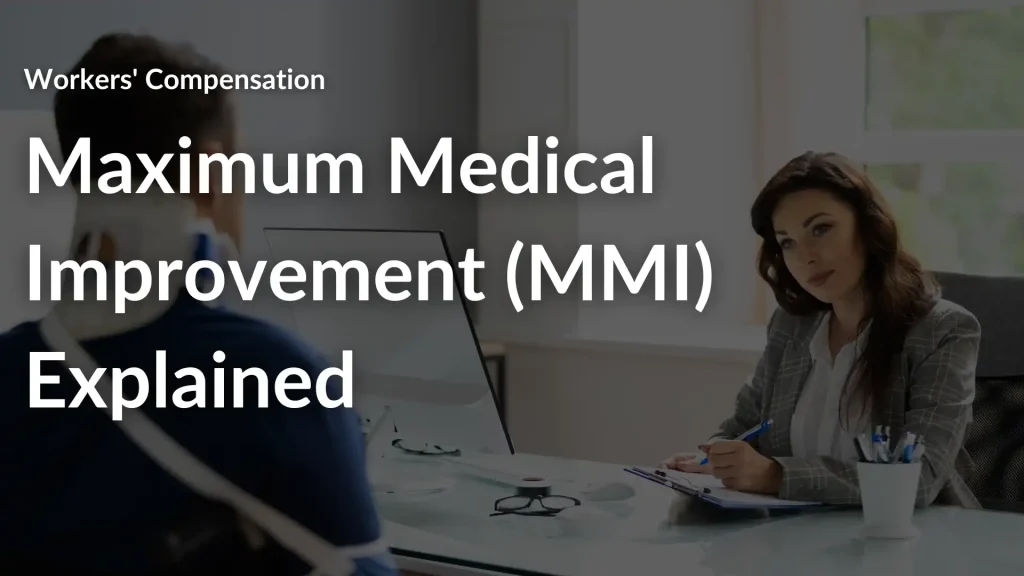Maximum Medical Improvement (MMI) Explained
Posted on Monday, July 1st, 2024 at 9:00 am

Workers’ compensation claims should be straightforward and reasonably easy for workers to understand. However, legal terminology, reporting standards, and covered medical care expenses can be confusing, especially when you are in pain and attempting to focus on recovery. But what is Maximum Medical Improvement (MMI)?
At Lawrence & Associates Accident and Injury Lawyers, LLC, our Ohio workers’ compensation lawyers help injured employees in Ohio and Northern Kentucky understand the meaning of maximum medical improvement (MMI) and how it can impact their workers’ compensation claims.
What Is Workers’ Compensation?
In states like Ohio and Kentucky, workers’ compensation is a no-fault insurance program that helps individuals who get hurt on the job cope with their injuries and associated medical expenses. In Ohio, the Bureau of Workers’ Compensation pays medical benefits and lost wages to employees hurt at work, no matter who caused the injury. The workers’ compensation insurance program provides benefits to employees hurt at work and protects employers from legal action. Nearly all employers must provide workers’ compensation insurance to their employees. The Kentucky Department of Workers’ Claims oversees the workers’ compensation program in that state.
In both states, if a worker’s treating physician keeps them off work during the course of their treatment, they can collect Temporary Total Disability (TTD) benefits, which pay a percentage of their lost wages while they can’t work.
What Is Maximum Medical Improvement?
According to the Bureau of Workers’ Compensation in Ohio, MMI is at the point in a person’s recovery when their condition or injury has stabilized. Further functional improvement of their condition is unlikely, even with continued medical treatment or rehabilitation. Although the term refers to a specific point in an injured person’s recovery journey, it does not relate to the person’s ability to return to work. The definition is similar in Kentucky.
In both states, TTD benefits must end when an individual reaches MMI. While a person may not receive TTD benefits, the medical treatment they need to maintain the stability of their injury or condition can continue through their workers’ compensation claim. In some cases, if the person once again becomes temporarily disabled due to the injury, TT benefits may apply again.
How Is Maximum Medical Improvement Determined?
Many injured individuals question how MMI is determined and who has the final say in whether a medical condition or injury has stabilized to the point where no further improvement is expected. In many jurisdictions, a physician of record makes the determination and provides information to the BWC or workers’ compensation insurer. After reviewing the medical records and documentation provided, the BWC or insurer can terminate TTD benefits as of the date MMI was reached, as indicated by the physician.
In some situations, the BWC or insurer will request an independent medical examination (IME) to determine whether an injured worker has reached MMI. When your doctor disagrees with the IME report, the BWC refers the claim to the Industrial Commission of Ohio for further scrutiny. The IC schedules a hearing and notifies you, your employer, and all representatives involved. You can continue collecting TT benefits until your hearing when the IC reviews all the information and issues its formal decision.
In Kentucky, if your doctor disagrees with the IME findings, you and your lawyer can request a hearing with an Administrative Law Judge in Kentucky.
How long it takes to reach maximum medical improvement depends on your situation and the severity of your injuries. Everyone fully recovers from trauma differently and responds to different treatment strategies. Explicitly following your doctor’s instructions and treatment plan is always in your best interest. Although reaching MMI and losing TTD benefits can be stressful, an experienced workers’ compensation attorney can guide you through the workers’ compensation claim process and work to maximize your benefits.
I Reached MMI, Now What?
 If your doctor or an IME doctor finds you have reached maximum medical improvement, expect workers’ compensation insurance to discontinue your TTD benefits. However, the loss of your TTD benefits does not mean you lose all compensation for your work-related injury. If you still require medical treatment, in most cases, workers’ compensation insurance still covers your related medical expenses. Additionally, if your TTD compensation ends because of MMI, understand that you may be eligible for other benefits depending on your condition or injury. After reaching MMI, you may still be able to recover benefits for the following:
If your doctor or an IME doctor finds you have reached maximum medical improvement, expect workers’ compensation insurance to discontinue your TTD benefits. However, the loss of your TTD benefits does not mean you lose all compensation for your work-related injury. If you still require medical treatment, in most cases, workers’ compensation insurance still covers your related medical expenses. Additionally, if your TTD compensation ends because of MMI, understand that you may be eligible for other benefits depending on your condition or injury. After reaching MMI, you may still be able to recover benefits for the following:
- A portion of your lost wages if you must return to work that pays less than your pre-injury job
- Rehabilitation if you cannot return to your original job and must retrain for another
- Permanent Total Disability benefits if your injury removes you from the labor force entirely
- Percentage for Partial Permanent Disability if you suffered a degree of permanent impairment that doesn’t prevent you from working
Under some circumstances, the insurance carrier may also offer you a lump sum settlement if you sign a document that releases them from future liability.
Talk to a lawyer before you sign anything or accept a lump sum settlement. Working with an experienced workers’ compensation attorney is the best way to get maximum compensation for your injuries. An attorney can review your case and evaluate which benefits you are entitled to, advocate for you with the workers’ compensation insurance carrier, and negotiate for the compensation you deserve. Achieving MMI doesn’t mean the end of your benefits.
Learn More About Your Legal Rights. Talk to a Workers’ Compensation Attorney Today
Don’t know what is maximum medical improvement (MMI)? To avoid long-term workplace injuries, determining maximum medical improvement for additional medical treatment can be difficult. The workers’ compensation process can be challenging when you are suffering from a painful injury. Give the reins to an experienced Kentucky and Ohio workers’ compensation attorney who can manage your claims, giving you the time and space you need to recover from your injuries or illnesses. At Lawrence & Associates Accident and Injury Lawyers, LLC, we’ll leverage our legal experience and workers’ compensation system knowledge to pursue the benefits you deserve.
Don’t wait to get proper legal representation for your maximum medical improvement payout. Call our office today at (513) 351-5997 or contact us online to arrange a complimentary legal consultation. We’ll discuss your situation and outline your options for recovering the benefits you need for your workers comp case. Our law firm represents clients in Cincinnati, Ohio and the surrounding areas, as well as in Northern Kentucky, for their workers compensation benefits claims.
Related Posts:
Demystifying SSDI: Calculating Benefits from Past Wages After Disability
How Many Work Credits Do I Need To Get SSD in Ohio and Kentucky?










